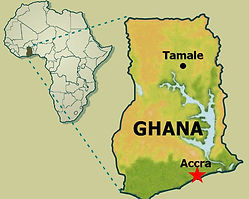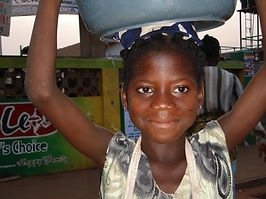
Ready and waiting for the Naapaulaisha school

Often young girls must babysit their younger siblings instead of going to school


Ready and waiting for the Naapaulaisha school
SUPPORT THE CHILDREN


Naa PaulAisha Eco-Village is a nonprofit organization dedicated to serving the children, mothers and artisans in Northern Ghana to help break the cycle of poverty.
My name is Princess Aisha Sibri. Welcome to Naa PaulaAisha Eco-Village, our page for the nonprofit that I co-founded with my husband, Paul Heynneman. We founded Naa PaulAisha Eco-Village to expand my early efforts to help my people in Ghana, where I was born.
I grew up in a small village near the rural city of Tamale, which is the capital of the northern region of Ghana. I went to a Catholic vocational school where I learned how to sew, do handwork and speak basic English. These skills have helped me build a good life for myself and my son as a young single mother, both when I was still living in Ghana as well as after immigrating to the United States and initially working as a seamstress.
I came to the United States in 1991 around the time the civil war broke out in my homeland in Ghana. I realized early that there was an opportunity to help my village. After some time working as a seamstress, I also began selling my organic home-made Shea butter as well as African arts and crafts that either I made personally or that people in my village made. I continue to sell these in the United States and send money and supplies back to Africa. I have been doing what I can to help for the last few decades.
People had always told me I should start a nonprofit with all the work that I was doing in Ghana, but I didn't make it official until I met my husband, Paul, who shared my love of helping people and my vision of creating a school. When Paul and I visit my village in Africa every year, we see places where we can help my people.
About 40% of the population in Northern Ghana's drought-ridden rural areas face insecurity around food and lack access to basic social services, sanitation, and safe drinking water. The civil war in Ghana in the 1990s set a lot of progress back and created many challenges on personal and structural levels.
Many children were orphaned and starving, or at least had to drop out of school. This created a large traumatized population without education or family, as well as damaged governing structures. Among the survivors, the lack of the traditional family support system, combined with the lack of skills and tools to support themselves, has blocked growth and contributed to a negative cycle of poverty.
What helped me to heal after the things that I saw in Ghana was keeping my hands busy making things, dancing and singing songs. These things make me happy and I know how healing these things can be for other people. It's a pure kind of healing while also giving them tools to survive and thrive. I want to share my experience and create opportunities for these grown children and their children to heal and make a good life for themselves.
How the Naa PaulAisha Eco-Village Began
My husband, Paul Heynneman, and I have been providing support to the community in my home village of Yendi for over 10 years out of our own pockets. We have been bringing supplies and offering support where we can. We have wanted to keep thinking bigger and we decided that a school would be a good way to make a better and longer lasting impact in the community. A few years ago, we decided to start the official nonprofit project, though we have been working on the project for many years.
Vocational School Project

We're in the process of building a school to help teach children practical skills and provide them with tools to support themselves. In particular, women and girls play integral roles in the agricultural society of the region, but have little power and few options. Women and girls are expected to work on the farm as well as being responsible for raising the young children, doing the housework, and going to get water and firewood. I recognized early that it is thanks to my training in sewing that I have not had to go hungry because I could always sew, tailor, or do hand crafts to get the money I needed to pay for food for myself and my son.
The school we are building will provide children with an education and community resources that will allow them to learn vocational and literacy skills. This will help them to live independently and be self-sufficient. This is really important for the girls because of how common abuse, exploitation, early marriage, pregnancy and abandonment of young girls is in the area.
Rather than being forced to beg or getting stuck in other unfortunate situations, the children can be given a place to go to gain an education and a school environment where they can be creative and have community. This education will serve them for the rest of their lives as well as the lives of their families and communities. Our goal is to contribute to breaking the cycle of poverty and exploitation in Ghana through education.


You can make a difference in the lives of the community in Tamale, Ghana. Your donation helps us keep serving the needs of the community now and in the long term as we work to build a school for children to learn valuable and practical life skills.

Volunteers are welcomed. Donations of much needed items are always appreciated, particularly sewing machines, school supplies and children's bikes.
